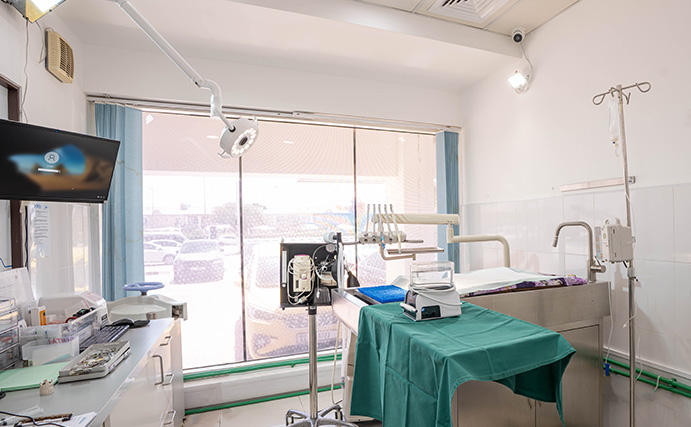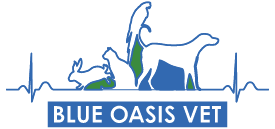Veterinary Dentistry
Is your pet’s breath noticeably bad? Do their teeth stain brown or have brown tartar covering them? Dental problems in pets are a lot more than a matter of appearance—they can be the source of ongoing pain, infection, and even organ failure.
At Blue Oasis Veterinary Clinic, we’re acutely aware of how profoundly interrelated good oral health is with overall pet health. Our veterinary dentistry is established to not just treat current problems but to prevent potential severe issues through early detection and regular treatment.
Why Dental Health is Important for Your Pet?
Dental disease is perhaps the most prevalent, under-addressed health problem in animals. Tartar accumulation and gum infection (gingivitis) are breeding grounds for disease-causing bacteria. If left alone, these bacteria could go into the bloodstream and harm the heart, kidneys, liver, and other organs. Dental infections may also result in
- Severe pain and tooth loss
- Trouble swallowing or chewing
- Fractures and jawbone infections
- Behavioural changes due to chronic discomfort
As in humans, prevention is always best. Brush your pet daily with pet-formulated toothpaste as part of an overall health routine. But after significant amounts of tartar and infection have accumulated, expert dental treatment is unavoidable.

What to Expect: A Veterinary Dental Cleaning
At Blue Oasis, we provide leading-edge dental care utilising ultrasonic scalers and polishers for deep cleaning your pet’s teeth, particularly below the gum line, where bacteria accumulate.
All dental treatments are incorporated.
- Full general anaesthesia for a pain-free, stress-free experience
- Detailed oral assessment
- Subgingival scaling (Cleaning below the gums)
- Tooth Polishing for Prevention of Future Plaque Deposition
- Digital dental X-rays, when necessary
- Tooth extractions if there is advanced decay or disease
Anaesthesia enables us to safely treat all areas in your pet’s mouth, reducing your pet’s stress while delivering maximum treatment effectiveness.
Frequently Asked Questions
Pets can suffer from numerous dental issues, including:
- Periodontal disease
- Worn-down or fractured teeth
- Oral abscesses or infections
- Kept baby teeth
- Tumours, cysts, or palate defects
- Misaligned bites and crowded teeth
The most prevalent periodontal disease arises from plaque, which turns into tartar. Pain, gum recession, tooth loss, and health problems for the overall system can all result from it. Over 80% of cats and dogs exhibit signs of it by age three.
Anaesthesia for pet dentistry is crucial because animals cannot be made to cooperate or hold still for treatment procedures. Anaesthesia is needed for deep cleaning below the gum line, x-rays, and extractions, which would otherwise be unsafe and painful. Anaesthesia provides a worry-free, pain-free experience and enables veterinarians to perform an accurate exam and cleaning. Anaesthesia keeps your pet from making sudden, unforeseen movements that might lead to cuts from sharp dental instruments. At Blue Oasis, we carefully monitor vital signs such as heart rate and oxygen saturation during anaesthesia to ensure your pet’s safety. The benefits of anaesthesia highly outweigh the minimal risks when in expert veterinary care.
As with all medical procedures, there are potential risks involved in using an anaesthetic, but advances in veterinary medicine and monitoring have made anaesthesia much safer. At Blue Oasis Veterinary Clinic, we go to great lengths to reduce any potential for complications. This includes pre-surgical blood tests, checking your pet’s vital signs, and adjusting anaesthetic levels while your pet is under anaesthetic. Most pets have an easy recovery and can go home the same day. Complications are rare, and compared to leaving your pet’s health at risk from neglected dental disease, it is a worthwhile possibility when weighed against future troubles that are bound to be more severe, painful, and costly.
Be sure to practice home dental care between cleanings to prevent plaque and tartar build-up. Brush your pet’s teeth daily, using pet-friendly toothpaste, for best results. Begin gradually, using rewards as encouragement, until your pet becomes accustomed to their mouth being touched and brushed. Brushing daily isn’t always feasible, but three times a week will help remove plaque and keep gums healthy. Use dental chews, plaque-reducing toys, and veterinarian-recommended water additions or dental foods as additional aids. Steer clear of hard substances such as bones or playing with stones, which can shatter your pet’s teeth. Inquire about all products claiming to help keep your pet’s teeth healthy from your veterinarian first.
Most pets should have regular dental checkups annually with the vaccination, but some small breeds or pets with a history of dental conditions might require checkups more frequently. Regular checkups can catch problems such as plaque, gum disease, and cracked teeth early in development, while regular cleanings prevent serious health issues and extraction or invasive procedures. Your veterinarian will recommend an ideal dental routine for your pet about age, breed, and history of oral health. Early and routine dental treatment keeps your pet comfortable, pain-free, and healthy for their lifetime.
Bad odour and visible tartar are indications that dental disease has already begun. Don’t ignore them! Make an appointment soon, and we will conduct a complete exam under anaesthesia, clean below the gum line, and evaluate further problems using X-rays. If needed, we will remove any teeth that are too damaged to be saved. Untreated dental disease can lead to severe pain and can impact the heart, liver, and kidneys. The sooner we treat, the better the results—and your pet will be healthier, happier, and less uncomfortable!



